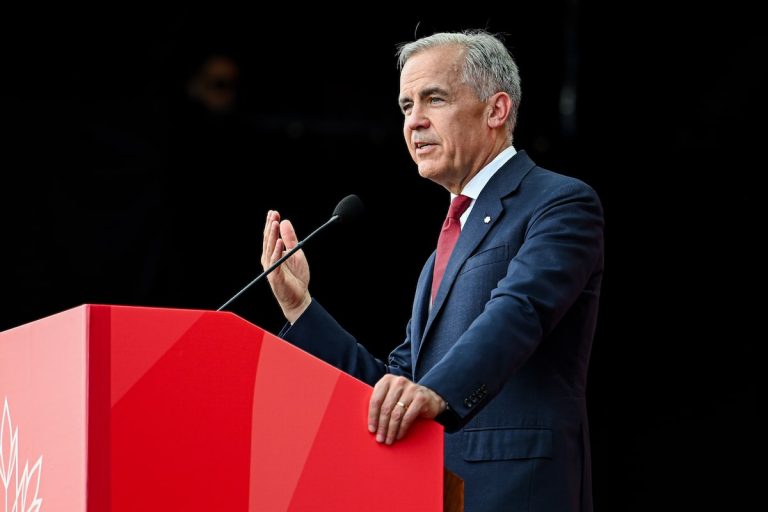
Canada’s ‘Finance Daddy,’ as some political pundits have called him, has political promissory notes coming due, writes John Turley-Ewart.Spencer Colby/The Canadian Press
John Turley-Ewart is a contributing columnist for The Globe and Mail, a regulatory compliance consultant and a Canadian banking historian.
Hiring a new manager to fix a broken business model and mollify your biggest, angriest customer carries a grace period – that time when the new hire can make promises, assemble a team, send the right signals to stakeholders and take decisions that might otherwise spark animated resistance.
Mr. Carney has made the most of his grace period. Recent polls suggest 52.7 per cent of Canadians prefer him as prime minister versus 22.9 per cent for Conservative Leader Pierre Poilievre – a margin of 29 percentage points.
Yet, the beginning of the end of the goodwill Mr. Carney has enjoyed is in sight. Canada’s “finance daddy,” as some political pundits have called him, has political promissory notes coming due. Whether he can pay them, in full or in part, is a question mark.
Carney touts national unity during speech at Ottawa’s Canada Day ceremony
To address the affordability crisis in Canada at an individual level, Mr. Carney’s Liberal Party announced a middle-class tax cut that “will save two-income families up to $825 a year.” Canada’s Parliamentary Budget Officer found that the typical dual-income family would save $280.
Mr. Carney’s Liberal Party also promised to build one Canadian economy where workers and goods can “move freely from coast to coast to coast.” Interprovincial trade barriers would be gone by Canada Day. July 1 came and went, and free trade within Canada has become an iterative process with some wins but no end date in sight.
Mr. Carney’s economic policy can be summarized by his own words when he won a minority government in April, “build, baby build.” Canada’s Prime Minister wants to unshackle investment, improve infrastructure and increase energy production and exports. The first steps to that end were taken in the Build Canada Act, part of new legislation passed by his government, Bill C-5.
It puts in place the legal framework needed to quickly approve large projects deemed by Ottawa to be national priorities, a move designed to attract investment to the country and to complete projects in a timely manner. Yet, Mr. Carney says he would not use the powers in Bill C-5 if it meant imposing a project over the objections of a provincial government.
Opinion: It’s up to the Senate – and maybe the Governor-General – to reverse Bill C-5
In other words, parochial interests have as much power today as they did before Bill C-5.
The immediate threat to Canada’s economic fortunes is U.S. President Donald Trump, and his stated commitment to use tariffs to raise tax revenue. There is no sign of any material improvement in Canada-U.S. trade relations despite Mr. Carney’s efforts.
Our Prime Minister has smiled his way through his visit to Mr. Trump at the White House in May, suffering the political circus that it was. He has met U.S. demands for more military spending, pledging in June to spend five per cent of Canadian gross domestic product by 2035 on defence. Mr. Carney has declined to impose full reciprocal tariffs on U.S. goods and showed understanding when the U.S. President abruptly left the G7 meeting in Kananaskis, Alta. None of it seems to matter much.
Red-flagging this reality for all Canadian business leaders was the government’s spectacular flip-flop on the digital services tax, an ill-conceived three-per-cent tax on Canadian income from digital services above $20-million generated by firms with $1.1-billion or more in global revenues.
The tax was expected to be collected starting June 30, and Mr. Carney’s government said it was proceeding as planned until Mr. Trump abruptly cut off trade negotiations because of the DST. Ottawa hastily rescinded the tax to win Mr. Trump’s favour and restart trade talks.
Opinion: What was Mark Carney thinking when he walked back the digital services tax?
This prompted columns in this paper and other platforms voicing the loudest criticisms yet of Mr. Carney’s government. It also seems to have been the last straw for one Liberal Party stalwart who unleashed on Mr. Carney’s government in an interview with The Canadian Press.
Lloyd Axworthy, Canada’s foreign affairs minister in the Liberal government of Jean Chrétien from 1996 to 2000, said out loud what many are now thinking in business and political circles – Mr. Carney’s trade negotiations with the U.S. are happening in “secret.” Mr. Axworthy asks: “When do we stop pretending it’s all part of some clever negotiating strategy that justifies bootlicking in hopes of tariff concessions?”
To answer Mr. Axworthy’s question, we may stop pretending when the 30 days to make a deal with Mr. Trump are up on July 21.
Mr. Carney has won the goodwill of many Canadians because they believed he was the best person to take on the President. That grace will not survive a U.S. trade deal that suggests Canadians hired the wrong guy for the job.




